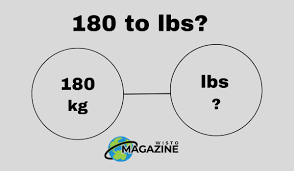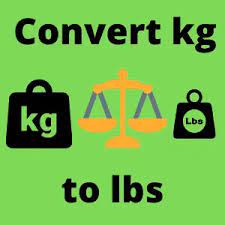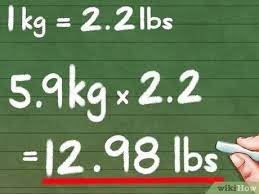180 Kg To Lbs: A Simple Conversion Guide
Are you looking to convert 180 kilograms to pounds? You’ve arrived at the proper location, then!
Converting 180 kilograms to pounds is a straightforward process. When you convert, you’ll find that 180 kilograms equals 397 pounds.
In this article, we’ll break down the conversion for you straightforwardly.
Understanding 180 Kg To Lbs:

The conversion of 180 kilograms to pounds holds practical value in numerous everyday situations. It’s rooted in a simple mathematical formula, with 1 kilogram approximately equal to 2.20462 pounds.
While this precision is functional, rounding the result to 397 pounds often suffices for practical purposes. Pounds are commonly used in the United States, while kilograms are prevalent in the metric system, making converting between them versatile for international communication.
Whether you’re tracking your weight, preparing for travel, adjusting recipes, or tackling educational tasks, this conversion skill proves its worth.
While online tools are readily available for quick conversions, having a fundamental grasp of the process ensures you can quickly and confidently navigate these scenarios.
Some Aspects To Consider When It Comes To Converting 180 Kilograms To Pounds:
1. Practical Utility:
Understanding how to convert from kilograms to pounds is a practical skill. It can be helpful when monitoring your weight or dealing with items measured in different units, such as luggage weight limits during travel.
2. Mathematical Conversion:
The conversion itself is based on a straightforward mathematical formula. Knowing that 1 kilogram equals 2.20462 pounds allows for quick and precise conversions.
3. Rounding:
In practical situations, it’s often sufficient to round the conversion to a whole number for simplicity. In this case, 180 kilograms is approximately 397 pounds.
4. Common Usage:
Pounds are commonly used in the United States and other countries, while kilograms are more prevalent in the metric system. Converting between these two units can be handy for international communication and understanding.
5. Versatility:
The ability to convert between units extends beyond weight. It can also apply to cooking, where recipes might use different units, or in educational settings for math and science-related tasks.
6. Online Tools:
While manual calculations are helpful, online converters and apps can quickly provide accurate conversions. However, having a basic understanding of the conversion process remains valuable.
7. Everyday Scenarios:
Whether checking your weight loss progress, packing for a trip, or adapting a foreign recipe, knowing how to convert 180 kilograms to pounds can simplify various everyday scenarios.
Why Convert 180 Kg To Lbs: Know The Reasons:

- Fitness And Weight Loss:
If you’re tracking your weight loss progress and your scale measures in kilograms, you should know your weight in pounds to understand your progress better.
- Travel Planning:
Some countries use kilograms for luggage weight limits, while others use pounds. Knowing how to convert between the two units can be helpful if you’re planning a trip and need to check your luggage weight.
Cooking And Recipes:
- Some recipes may use kilogram ingredients, but you’re more comfortable with pounds. Converting the measurements can help you follow the recipe accurately.
- Math And Education:
Knowing how to convert between kilograms and pounds is a valuable skill if you’re a student or working on math problems involving unit conversion.
Precautions While Converting Kg To Lbs: Explore Now:

1. Use The Correct Conversion Factor:
Ensure you use the accurate conversion factor, approximately 2.20462 pounds per kilogram. Rounding this factor to 2.2 or 2.2 pounds per kilogram is acceptable for most practical purposes.
2. Precision Vs. Simplicity:
Consider the level of precision you need for your specific task. If you require a precise conversion, use the whole factor. However, for most everyday situations, rounding the result to a whole number simplifies things without sacrificing accuracy significantly.
3. Units Consistency:
When converting weights, ensure that you are consistent with your units. If you convert kilograms to pounds, ensure the original weight is in kilograms.
4. Double-Check Calculations:
Math errors can occur, especially if calculations are done manually. Double-check your work to avoid mistakes, especially when dealing with critical measurements.
5. Consider Context:
Think about the context in which you’re using the conversion. Different situations may require different levels of precision. For example, a precise conversion may be necessary when tracking weight loss, whereas rounding may be acceptable for luggage weight limits during travel.
6. Online Tools:
Utilize online conversion tools or apps if you need highly accurate conversions quickly. These tools can provide precise results without the risk of calculation errors.
7. Understand The Application:
Know why you’re making the conversion. Understanding the purpose, whether for fitness tracking, travel planning, cooking, or education, will guide you in choosing the appropriate precision and units.
Conclusion:
In the world of measurements, converting kilograms to pounds is a valuable skill with broad applicability. You can ensure accuracy in your conversions by adhering to some basic precautions, such as using the correct conversion factor, considering the necessary level of precision, and double-checking calculations. Whether you’re tracking weight loss progress, planning a journey, adapting a recipe, or tackling educational tasks, the ability to convert between these units simplifies numerous aspects of daily life. You can navigate these scenarios confidently and efficiently with online tools for precise conversions or understanding the conversion process for more casual needs.
Frequently Asked Questions:
1. Can I Round The Result To A Whole Number For Simplicity?
Yes, rounding the conversion result to the nearest whole number is acceptable for most practical purposes. For example, 180 kilograms can be rounded to approximately 396 or 397 pounds.
2. Can I Use The Same Method To Convert Pounds To Kilograms?
Yes, you can reverse the process of converting pounds to kilograms by dividing the number of pounds by the conversion factor (approximately 2.20462).
3. Are There Any Online Resources For Quick Conversions?
Some numerous online converters and apps can instantly perform kilograms-to-pounds conversions. These tools help obtain precise results without manual calculations.
4. Can I Use Online Converters For Accurate Conversions?
Online conversion tools or apps are readily available and provide precise conversions quickly. They are a convenient option when high accuracy is required.
Read More: